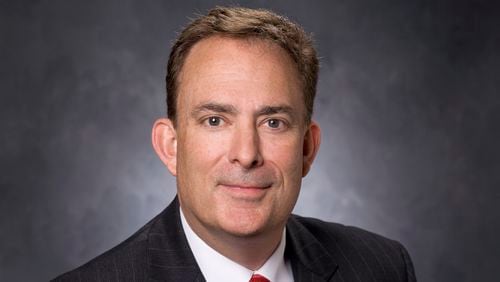While the risk of a downturn is creeping up, the odds are good that the coming year will bring solid economic growth in the state’s industries, according to the annual forecast by the University of Georgia’s business school.
Fewer jobs will be created than in the past few years, said Benjamin Ayers, dean of UGA’s Terry College. Still, he said, “We are expecting all of Georgia’s industries to add jobs next year.”
“We are expecting another year of good, solid growth,” he told The Atlanta Journal-Constitution.
Ayers also outlined the school’s forecast Thursday to a large lunch gathering at Atlanta’s Marriott Marquis. He told the crowd of about 600 that Georgia’s welcoming business climate allows it to get the most of broader trends.
“We will out-perform the national economy for the third straight year,” he said.
Ayers predicted more than 100,000 people will move to Georgia during the year – roughly 10 times as many as in the aftermath of the recession.
That influx will provide skills to the labor pool and inject new demand for goods and services, he said. “That historically has been a driver of growth in the state.”
This week’s decision by the Federal Reserve to raise the benchmark interest rate a quarter point – the third in a year, but only the fifth in a decade – will do little to chill growth, he said. But the Fed is expected to keep raising rates in the coming year. Sooner or later, the higher cost will start to burden borrowing.
“That is a headwind. And we think the risk of recession is a bitter higher in the new year, but it is more likely to happen in 2019.”
Other risks include uncertainty about health-care policy – which affects a large portion of the metro Atlanta economy – as well as the possibility of global economic turbulence or a stock market sell-off.
But none of them yet looks potent enough to threaten what is one of the longest expansions on record.
Also speaking at the event was Dennis Lockhart, who recently retired after a decade as president of the Federal Reserve Bank of Atlanta. Lockhart agreed that age alone is not enough to kills an expansion.
But he also said the economy is not poised for a growth spurt.
Two large problems have been holding the economy back, and experts don’t quite understand either one, he said.
First, productivity growth has been very weak, despite the spate of new technologies in the hands of American companies and consumers. “Innovation and technology are not having the same impact on the economy as electricity did.”
The other is demographics: A baby boom generation is gradually shuffling out of the labor force as an even-larger group of millennials rolls in, while not yet living up to its economic potential.
“I think that the impact of demographics on the economy is under-appreciated by modern economists,” Lockhart said.
Lockhart said that projections for the national economy should also include “a modest lift” from the tax bill currently being negotiated in Congress. But he said that rosier predictions about the tax change spurring spectacular growth were “unrealistic.”
About the Author







